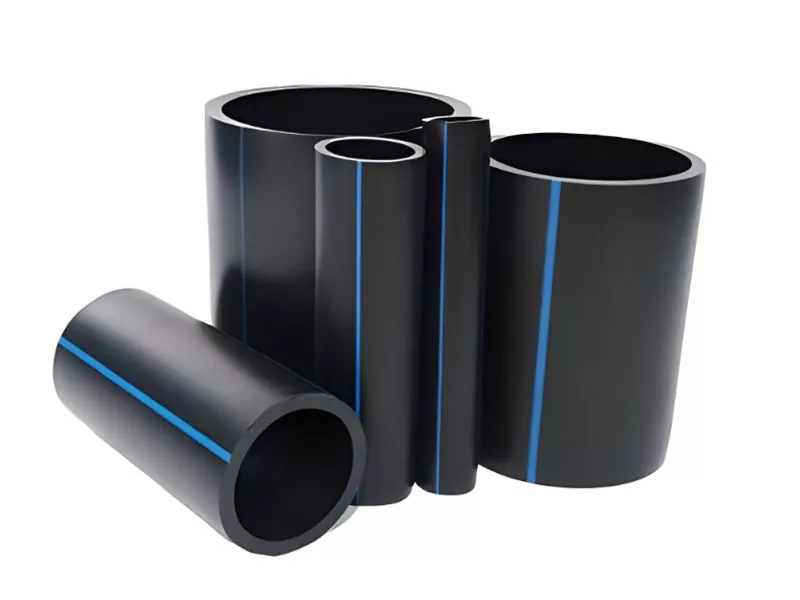Understanding the Secret Conveniences of HDPE Pipeline for Water and Wastewater Administration
Making use of HDPE pipe in water and wastewater management offers various advantages that merit consideration. Its exceptional longevity and lengthy life-span make it a recommended selection for lots of tasks. Furthermore, the material's resistance to corrosion and chemical damages improves its integrity in different environments. Nonetheless, the advantages prolong past just longevity and resistance. Discovering its cost-effectiveness and environmental impact exposes a lot more engaging reasons for its prevalent fostering in modern-day infrastructure
Extraordinary Sturdiness and Long Life

HDPE pipe sticks out for its extraordinary sturdiness and durability, making it a preferred option in water management systems. Built from high-density polyethylene, these pipelines can endure considerable stress and stress and anxiety, making sure trusted performance over time. Their robust nature allows them to withstand extreme ecological problems, including temperature variations and dirt activities, which can create various other products to fall short.
The lifespan of HDPE pipes commonly exceeds 50 years, providing an economical option for towns and markets alike. Additionally, the product's light-weight properties simplify installation, decreasing labor expenses and timeframes. This toughness lessens the need for regular repair services or replacements, further enhancing its economic appeal.
In water administration applications, the reliability of HDPE pipes means less disturbances and enhanced solution continuity, making them integral to lasting framework growth. The combination of resilience and longevity solidifies HDPE's role as a cornerstone in efficient water administration solutions.

Resistance to Rust and Chemical Damages
While lots of materials catch deterioration and chemical damages over time, HDPE pipelines exhibit impressive resistance, making them excellent for various water monitoring applications. This strength originates from the molecular structure of high-density polyethylene, which is inherently non-reactive and does not corrode like steels or deteriorate from direct exposure to extreme chemicals. As a result, HDPE is highly effective in atmospheres with aggressive materials, such as wastewater systems that may have acids, bases, and organic solvents.
In addition, HDPE pipes can hold up against environmental variables such as soil level of acidity and saline conditions, better improving their viability for diverse applications (Pipe Supplier American Plastics Midland). Their capacity to preserve architectural stability in time minimizes the risk of leaks and failings, which is important in making sure the safety and security and dependability of water distribution and wastewater management systems. The resistance to corrosion and chemical damage noticeably adds to the total performance and long life of HDPE piping remedies.
Cost-Effectiveness and Economic Benefits
When considering the financial ramifications of water administration systems, the cost-effectiveness of HDPE pipes ends up being apparent. These pipes provide lower installation and upkeep prices contrasted to typical products like steel or concrete. Their lightweight nature simplifies transport and installment, resulting in reduced labor expenses. Additionally, HDPE pipelines show a lengthy life-span, often surpassing 50 years, which translates to less substitutes and long-lasting cost savings.
Moreover, the resistance of HDPE to rust and chemical damage lessens the need for pricey repair work and replacements. The pipelines likewise support efficient water flow, reducing energy prices connected with pumping systems. By minimizing leaks and water loss, HDPE pipelines contribute to significant financial hydro jetting pipes benefits for municipalities and sectors alike. Generally, the preliminary investment in HDPE piping can yield significant financial returns over the life-span of the water administration system, making it a prudent selection for sustainable facilities development.
Ecological Sustainability and Decreased Impact
_-_Post_di_Facebook_-_Dimensioni_personalizzate_(1)_60cafdf20856f.png)
Convenience and Adaptability in Installment
Since of their one-of-a-kind residential properties, HDPE pipelines offer remarkable flexibility and versatility in setup, making them appropriate for a vast array of applications. Their lightweight nature permits less complicated handling and transportation, minimizing labor expenses and installation time. HDPE pipes can be curved and formed to fit different terrains and task requirements, which is especially advantageous in challenging atmospheres.
In addition, their resistance to rust and chemical damages permits for setup in varied setups without the demand for specialized safety finishes. The ability to fuse joints produces a he has a good point constant, leak-free system, improving the total stability and reliability of the setup. HDPE's adaptability also accommodates ground movement, minimizing the threat of damages in areas prone to shifting dirt. Generally, these attributes make HDPE pipes not just functional yet additionally a favored choice for water and wastewater monitoring systems.
Frequently Asked Inquiries
Just How Does HDPE Pipe Compare to PVC in Water Management Applications?
HDPE pipeline offers exceptional flexibility, resistance to corrosion, and resilience compared to PVC. Its lighter weight assists in less complicated installment, while its lengthy life-span lowers substitute prices, making HDPE a preferred option in water management applications.
What Is the Life Expectancy of HDPE Pipes Under Common Conditions?
Under typical conditions, HDPE pipelines can have a life-span ranging from 50 to 100 years. Their toughness and resistance to rust go to these guys add to their long-term performance in various applications, making them a dependable option for facilities.
Are HDPE Water Lines Recyclable After Their Life Span?
Yes, HDPE pipelines are recyclable after their service life. American Plastics HDPE Pipe for Oilfield. They can be processed and repurposed right into new items, significantly reducing ecological effect and advertising sustainability within the market, making them a green option for piping remedies
What Is the Setup Refine for HDPE Pipeline?
The installment process for HDPE pipelines entails site preparation, trenching, pipeline fusion or mechanical joining, backfilling, and stress testing. Correct methods guarantee a sturdy and efficient system for carrying water and wastewater effectively.
Can HDPE Pipeline Be Made Use Of for Both Potable and Non-Potable Water Solutions?
Yes, HDPE pipelines can be made use of for both potable and non-potable water systems. Their versatility, sturdiness, and resistance to corrosion make them suitable for various applications, making sure secure and reliable transportation of water in different contexts.